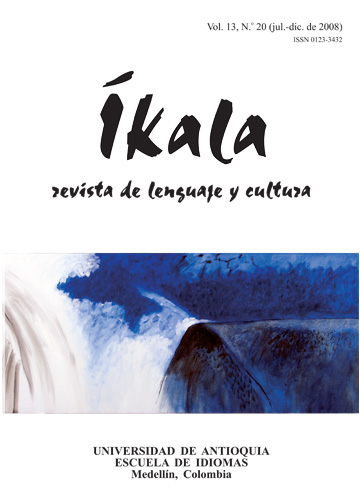Estudio comparativo de las traducciones al turco y al español de Las Brujas de Salem.
DOI:
https://doi.org/10.17533/udea.ikala.2681Palabras clave:
cortesía lingüística, comportamiento político, género, poder, traducciónResumen
Este texto demuestra cómo los cambios que han sucedido en las relaciones de género y poder afectan el proceso de traducción de un texto literario. Concretamente, nos centramos en la traducción de las formas de cortesía y del comportamiento político en la obra El Crisol de Arthur Miller. Mientras sólo hay una traducción al turco (1962), para el análisis de las traducciones españolas se han seleccionado dos de distintos períodos: una de 1955 y la otra de 1997. El objetivo, en últimas, es señalar cómo las traducciones se convierten en un reflejo de la situación socio-cultural del país meta, en el momento en que se producen.
Recibido: 04-10-2007 / Aceptado: 04-08-2008
Cómo referenciar este artículo:
Gonzalez Vera, P. & Yalcin Tilfarlioglu, F. (2008). Estudio comparativo de las traducciones al turco y al español de Las Brujas de Salem. Íkala. 13(2), pp.31-54
Descargas
Citas
Alvarez, R. and Vidal, C. (1996). Translation Power Subversion. Clevedon: Multilingual Matters LTD.
Boxer, D. (2002). Applying Sociolinguistics. Amsterdam: John Benjamin Publishing.
Brown, P. and Levinson, S. (1987). Politeness. Some universals in language usage. Cambridge: Cambridge University Press.
Cantor, M. G. (1986). The Soap Opera. Thousand Oaks: The Sage Commtext Series Vol. 12, Sage Publications.
Cheng, W. (2003). Intercultural Conversation. Amsterdam: John Benjamins Publishing.
Culpeper, J. (1996). Towards an anatomy of impoliteness. Journal of Pragmatics, 25, 349-367.
Diccionario de la Real Academia Española. http://www.rae.es
Dino, G. (1978). Sabahattin Eyuboglu ve Turkiye'de Ceviri Hareketleri (Sabahattin Eyuboglu and Translation Activities in Turkey). Turk Dili (Turkish Language), Temmuz 322, 104-111.
Dixon, R. M. W. (1972). The Dyirbal language of North Queensland. Cambridge: Cambridge University Press.
Eckert, P. and McConnell-Ginet, S. (1998). Communities of practice: where language, gender and power all live?. In Coates, J (ed.). Language and Gender: A Reader (pp.484-494). Oxford: Blackwell.
Edgard, A. and Sedgwick, P. (eds.). (1999). Key Concepts in Cultural Theory. London, New York: Routledge.
Fiske, J. (2001). Television Culture. New York: Routledge.
Fraser, B. and W. Nolen (1981). The association of deference with linguistic form. International Journal of the Sociology of Language, 27, 93-109.
Goffman, E. (1967). Interaction Ritual: Essays on Face to Face Behaviour. New York: Anchor.
Goldman, R. (1992). Reading Ads Socially. London: Routledge.
Gunter, B. (1995). Television and Gender Representation. London: John Libbey.
Haas, M. (1944). Men's and women's speech in Koasati. Language, 20, 142-149.
Holmes, J. (1995). Women, men and politeness. London: Longman.
Hymes, D. H. (1972). ''Models of the interaction of language and social life''. In Gumperz, J. J. and Hymes, D. H. (eds.). Directions in sociolinguistics. The ethnography of communication (35-71). New York: Basil Blackwell.
Howarth, D. (2002). Discourse. New Delhi: Viva Books.
Jakobson, R. (2000). On linguistic aspects of translation. In Brower, R.A. (ed.). On Translation (232-239). Cambridge: Harvard University Press.
Joos, M. (1967). The Five Clocks. New York: HBJ Harbinger.
Leuven-Zwart, K. van and Naaijkens, T. (eds.) (1991). Translation Studies: State of the Art. Amsterdam: Rodopi.
Lefevere, A. (1992). Translating Literature: Practice and Theory in a Comparative Literature Context. New York: Modern Language Association of America.
Lefevere, A. (1992a). Translation, Rewriting and the Manipulation of Literary Fame. London and New York: Routledge.
Miller, A. (1968) [1953]. The Crucible. A Play in Four Acts. London: Penguin Books.
Miller, A. (1955). Las brujas de Salem. Drama en cuatro actos. Translators: Jacobo and Mario Muchnik. Buenos Aires: Compañía General Fabril Editora.
Miller, A. (1962). Cadi kazani. Translators: Sabahattin Eyüboglu and Vedat Günyol. Ankara: Milli Egitim Bakanligi
Miller, A. (1996). Why I Wrote The Crucible. The New Yorker, published in October 21 and October 28, 158–164.
Miller, A. (1997). Las brujas de Salem. Drama, y El crisol. Guión cinematográfico basado en la obra de teatro. Translator: José Luis López Muñoz. Madrid: Tusquets.
Mills, S. (2004). Rethinking Politeness, Impoliteness and Gender Identity. Taken October 1, 200710-04 from http://www.linguisticpoliteness.eclipse.co.uk/Gender%20and%20Politeness.htm
Schäffner, C. and Kelly-Holmes, H. (eds.). (1995). Cultural Functions of Translation. Clevendon: Multilingual Matters Ltd.
Tilfarlioglu, Y. F. (1996). An Investigation of the use of drama Methods in Literature Courses in the English Language and Literature Departments in Turkey.An unpublished doctoral thesis. Cukurova University. The Institue of Social Sciences: Turkey.
Toledano Buendia, C. (2003). La traducción de la Obscenidad. Santa Cruz de Tenerife: La Página.
Walsh, C. (2000). Gender and mediatised discourse. Unpublished PhD thesis, Sheffield, UK, Sheffield Hallam University.
Watts, R. (1992). Linguistic politeness and politic verbal behaviour: reconsidering claims for universality. In Watts, R., Sachiko, I. and Konrad, E. (eds.). Politeness in Language: Studies in its History, Theory and Practice (155-199). Berlin/New York: Mouton de Gruyter.












